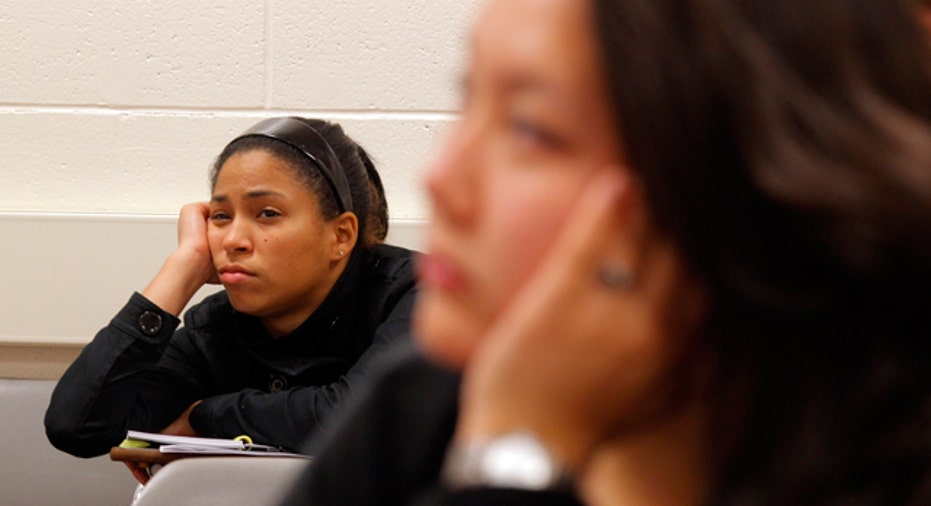More Baby Boomers Head Back to College

Growing up is tough enough without the worries of your financial future, so Money101 is here for you. E-mail us your questions and let us take off some of the pressure.
With 78 million baby boomers approaching retirement this year, many of them are swapping hitting the links with hitting the books.
According to a 2007 survey by U.S. News and World Report, the number of college students ages 40 to 64 has increased nearly 20% to almost two million in the last decade.
Students generally want to ensure that they will get a return on their investment in education and that the credentials they seek will pay dividends either through a better paying job, higher-level position or new career path, says Lisa Paris, assistant vice president of marketing and communications with Peirce College in Philadelphia. Some older students, however, return to school for personal fulfillment reasons and to prove to themselves that they can do this.
The reasons for the increase in boomers headed back to college vary: some are looking to advance or have encore careers while others simply want to learn a new subject or are going for the first time.
Although boomers comprise a considerable percentage of those going back to school, they arent alone: Non-traditional students, or those who are older and may have obligations such as a family to support and a full or part-time job, have been turning back to school as well.
The U.S. Department of Education estimates that 90 million adults partake in some type of education each year, including training and basic education offered outside traditional higher education, such as distance or online learning.
I think people in mass are going back to college trying to get these different skill sets to [protect themselves] against unemployment, says Abe Burnett, who received his first degree over the age of 30 and is currently working on two consecutive masters degree programs in economics and computer science. My motivation when I went to school was to make sure I had a skill set that was hopefully not driven by speculative bubbles, but that I could use to find real work in any economy.
Factors to consider
Experts warn there are some considerations that boomers need to take into account when deciding to go back to school.
Unfortunately, age can make a difference--the amount of time that boomers will be able to work after getting their degree is definitely something to think about, Paris says.
Concerns about collecting social security and the need for job security as they work longer are just some of the many motivations and aspirations impacting the decision to return to school, she says.
Jane White, president of Retirement Solutions and author of America: Welcome to the Poorhouse, argues that the majority of boomers will need to work longer than they might have planned (through their 70s, and possibly their 80s) to fund their retirement accounts and may not be able to afford to go back to school.
If they quit a job to go to college, they are not only giving up salary but increasing costs, especially if they wind up going fulltime to attain a four-year degree as opposed to part-time, says White.
After completing their degree, White also says that boomers age could put them at a serious disadvantage in the labor market as young professionals compete for the same positionsand often for less salary requirements.
Even in high-paying jobs like nursing, employers are more likely to hire younger people, because their health care and salary costs are lower, she says.
Older students might be more likely to get more federal aid compared to their younger counterparts to fund their education. According to FinAid, students age 24 and above are considered independent and eligible for increased unsubsidized Stafford loan limits. For students with a bachelors degree, some schools may waive restrictions for their own financial aid programs.
Boomer-aged students are more likely to have more debt than younger students, and should take that into consideration when determining the cost of going back to school.
Boomers are already tackling more costs than their parents because they are more likely to have a mortgage, says White. More than 50% of boomers between the ages of 55 and 65 were paying mortgages in 2007 on average owing more than $140,000, according to the Federal Reserve Board's Survey of Consumer Finances. That amount is nearly three times what was owed by that age group in 1989, when only 34% were still making mortgage payments.
Personal preferences
If boomers are committed to going back to school and continuing their education, Paris suggests choosing a college that is structured to support older students, especially in terms of class size, class format and style and what kind of support services are available.
If they have been out of an academic environment for a long time, find out how the college prepares students to transition back to studying and college-level courses, she says.
Boomers looking to attend classes on campus over online, Paris suggests visiting the campus to see if its a good fit. She suggests speaking to professors and staff to see what resources are available for older students.
"Students of all ages need to be sure that they fully understand the costs of their degree and can afford their education, says Paris. Its the same as making any type of investment.



















